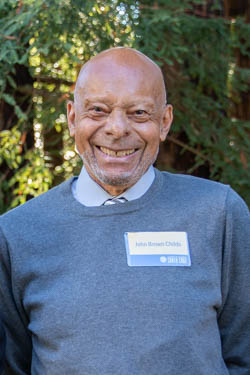Campus News
The struggle to protect voting rights must go on. Lessons from the Civil Rights Movement can help
Distinguished professor emeritus John Brown Childs shares his opinion on the U.S. Senate’s recent blockage of voting rights legislation and reflects on lessons he learned during the Civil Rights Movement that may help voting rights activists today.


John Brown Childs is a distinguished professor emeritus of sociology and serves on the advisory committee for John R. Lewis College at the University of California, Santa Cruz.
This past week, the world watched as Republicans in the Senate blocked two key pieces of legislation intended to restore voting rights protections that civil rights activists of the 1950s and 1960s dedicated their lives to achieving. To some of us who were participants in and witnesses to those foundational struggles of the Civil Rights Movement, it seems we may now be living through another dangerous time in U.S. history. And a new generation is being called to stand up for their rights and their future. I know this may feel frustrating, discouraging, and disconcerting for today’s young people. It felt that way at times for my generation, too.
I was a college student in 1965 when I participated in efforts to register Black voters in Montgomery, Alabama, with the organization Friends of the Student Nonviolent Coordinating Committee. We faced constant threats of violence from police and white supremacists. This was right after “Bloody Sunday,” the pivotal 1965 Selma to Montgomery march for voting rights, during which John Lewis and many other civil rights activists had been brutally beaten at the Edmund Pettus Bridge.
Those acts of violence—and many, many others—were enabled by what can only be called local state-level totalitarian environments of entwined legal, political, social, economic, and cultural support for acts of terrorism that aimed to intimidate, dissuade, and demoralize civil rights activists. It would take “a thousand years” to bring real pro-democracy change, proclaimed some supporters of segregation.
Yet, as I witnessed, those in the movement did not give up; and it did not take “a thousand years” for the dismantling of legal segregation to be accomplished. In part, I suggest, we did not give up because we did not try to act on the basis of predicting the future. We did not know what would actually work, or how long it would take to change that totalitarian environment. But we did know the importance of doing the right thing. The key word in that phrase is the verb “doing.”
Cynics and pessimists proclaim the world to be impervious to genuine positive human development. But those who “do,”—the activists—know and experience the amazing reality that change is brought into existence when you act to make it happen, even in a small way. Thousands of people doing hundreds of thousands of positive, cooperative actions can create constructive consequences that are unimaginable in the moment.
The Civil Rights Movement actualized itself through non-violence and compassion in the midst of heavy, negative, repressive, and dangerous powers that seemed to have the upper hand—until they didn’t, often in unpredictable ways.
On August 6, 1965, after years of struggle and courage on the part of civil rights activists, the Voting Rights Act of 1965 was passed. That historic piece of legislation prohibited racial discrimination in voting by combatting state-level dissenfranchisement practices, securing the right to vote for Black Americans across the country.
This and other successes of the Civil Rights Movement were pivotal in propelling and supporting equally successful actions by other inclusionary movements. Today there are more women of all races and more people of color in elected and appointed positions than ever could have been imagined in 1965. The election of Barack Obama as president was a key visible peak of this deep and wide change.
It’s important to recall those successes, and how they were accomplished, as we face the present moment. From the Supreme Court’s 2013 gutting of key provisions of the 1965 Voting Rights Act to the recent deluge of restrictive, anti-democracy curtailments of voting in numerous states, earlier progress is being rolled back, literally “with a vengeance.” And in a clear refusal to address these issues, Senate Republicans have voted against the Freedom to Vote Act and the John Lewis Voting Rights Advancement Act.
Now is the time for each of us to act on behalf of democracy. Volunteer with a voter registration campaign. Donate and vote in support of political leaders who are fighting voter suppression. Join an advocacy group to push for a more equitable future. Whatever you do best, do it in support of democracy. And do it because it’s the right thing to do. Together, we will weave an interlocking web of pro-democracy resilience across this country.
That’s the task that lies ahead. And a new generation of civil rights activists is rising to it. For those who are much younger than I—please know that you now stand poised on the pro-democracy path. This path has had, over several hundred years, many twists and turns, ups and downs, and it will have many more. But it stretches before you. Awaken to the call of democracy. Do whatever positive action you can, where you are. Defend the work of those gone by. Protect your future and that of coming generations.